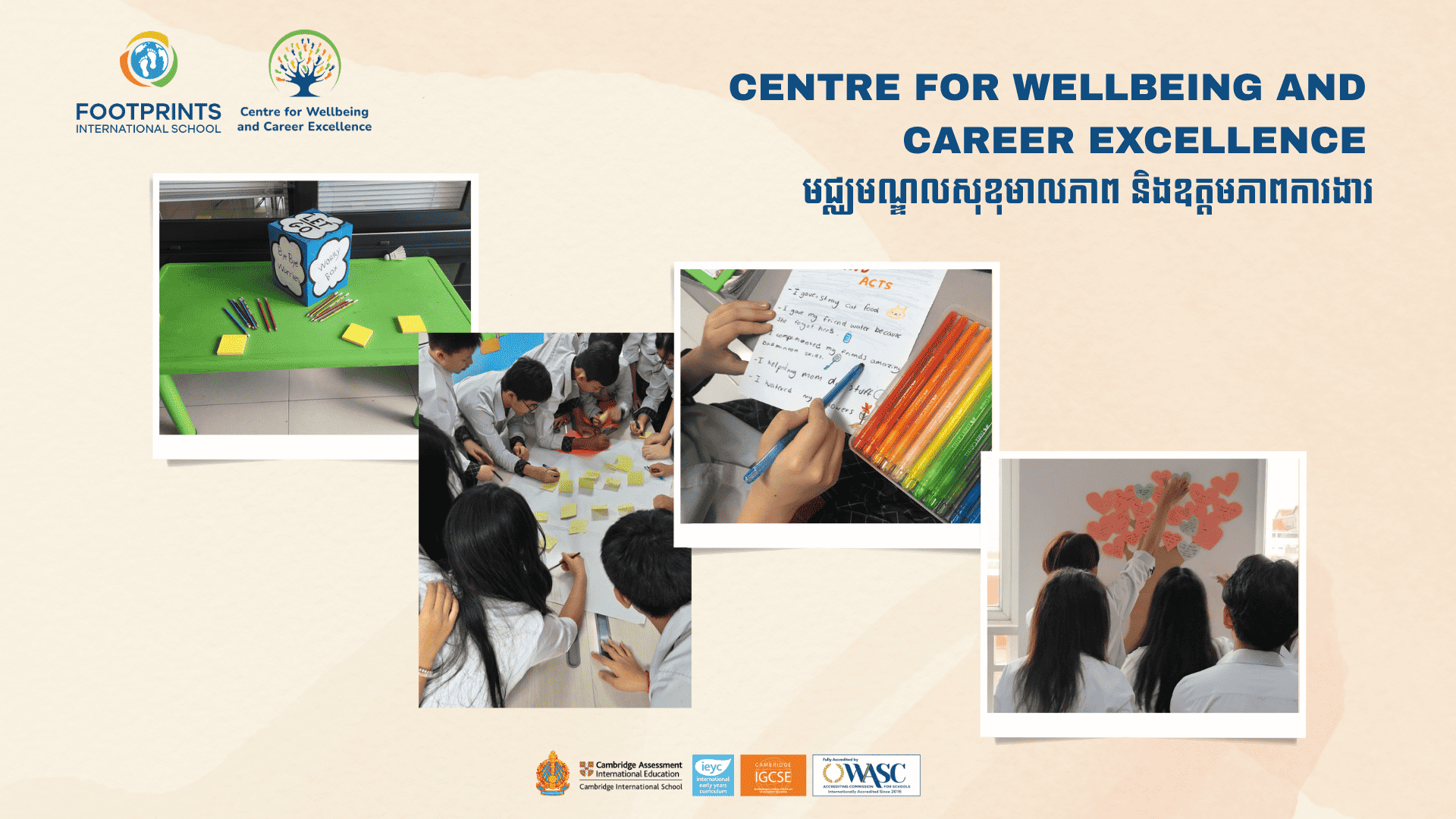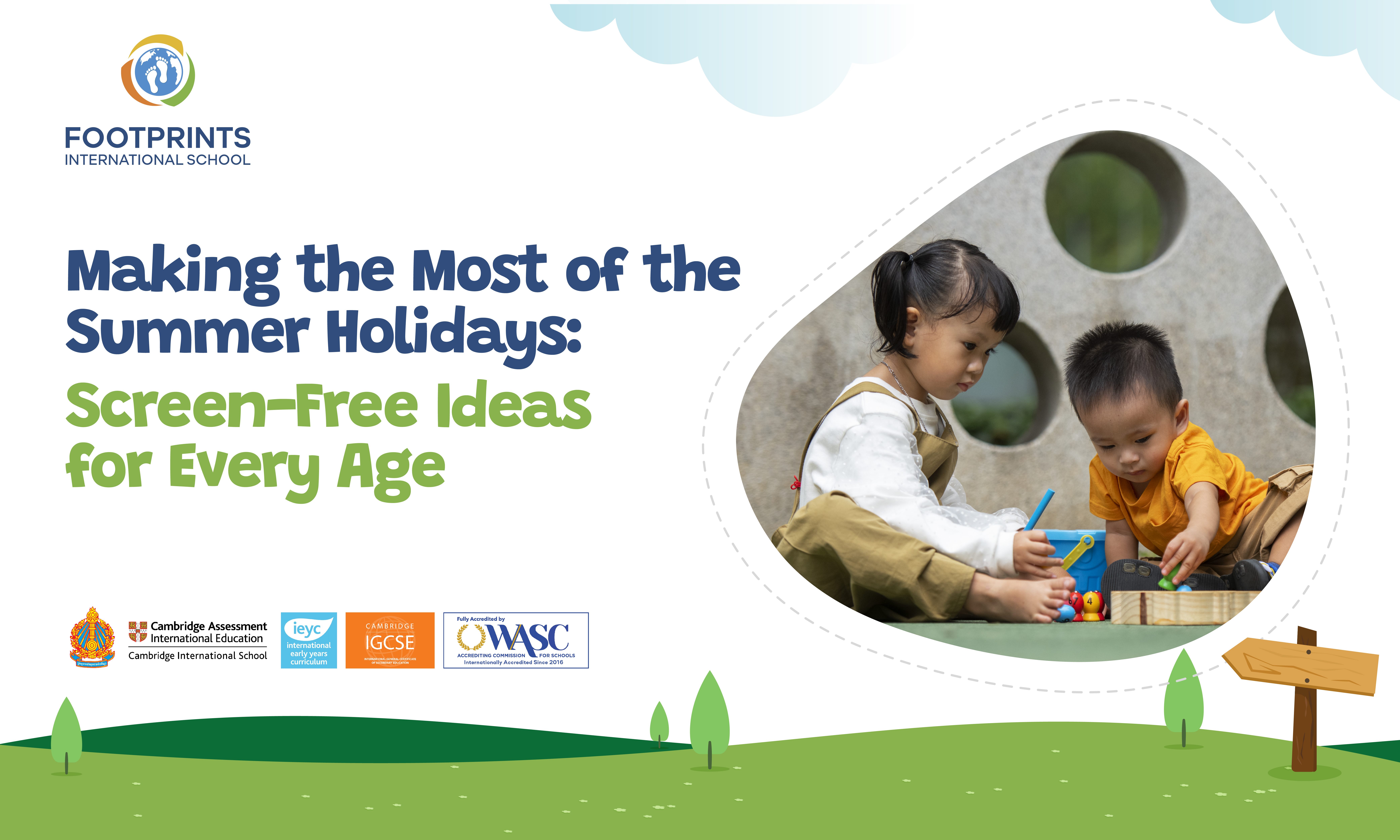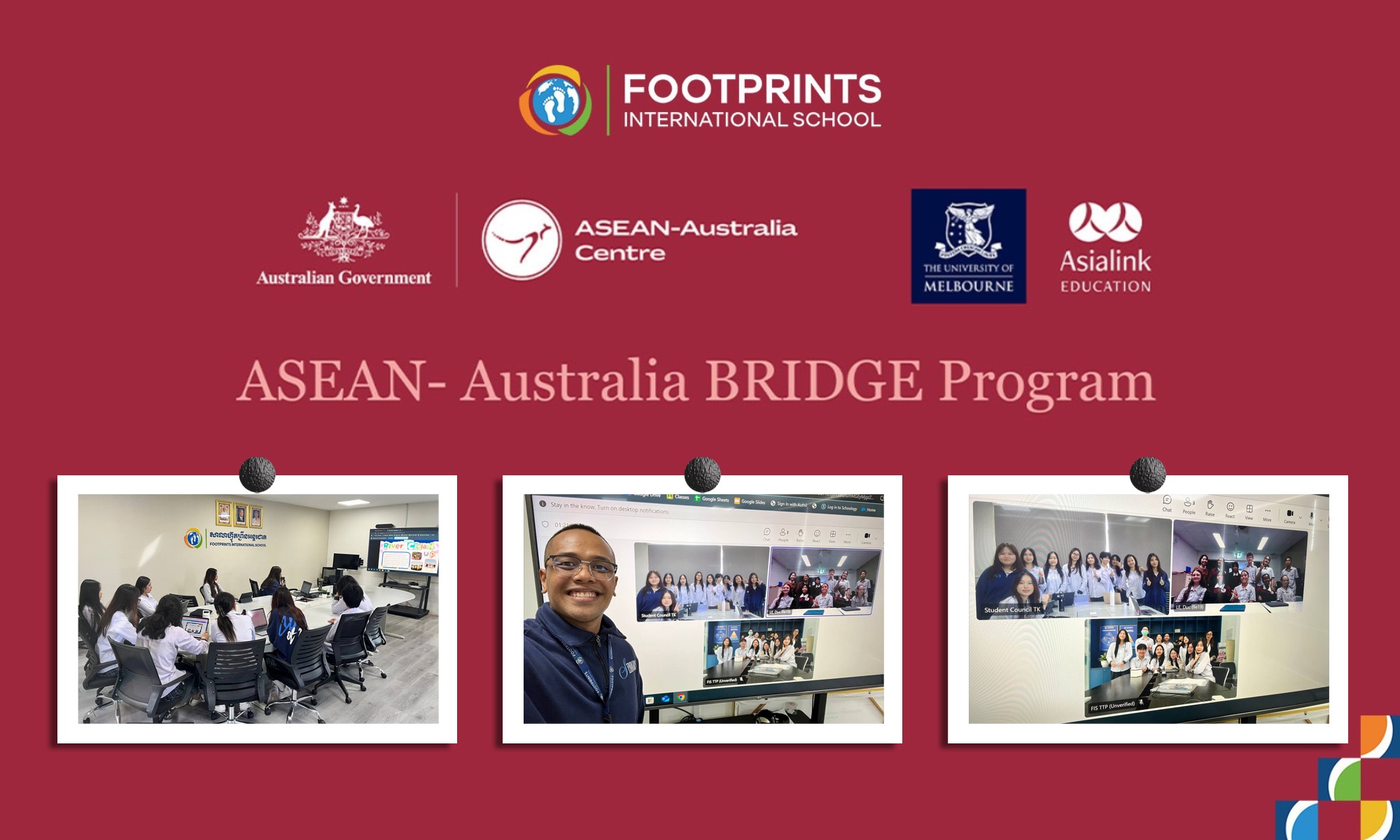
(English) At Footprints, we believe that a nurturing and psychologically safe environment is the foundation for every learner’s success. Research consistently shows that psychological safety is crucial for students as it creates a space where they feel secure to express themselves, take risks, ask questions, and learn from mistakes without fear of judgment or humiliation. This environment fosters emotional wellbeing, self-confidence, and cognitive engagement, all of which are essential for effective learning and personal growth.
Two years ago, Footprints International School took a bold and visionary step by launching the Centre for Wellbeing and Career Excellence (CWCE). This dedicated centre was created to coordinate and provide the best possible support for the wellbeing of both students and staff. Our goal was clear: to ensure every individual in our community feels supported, understood, and empowered.
The CWCE offers a wide range of services, including reading intervention and English language support. Importantly, students and staff have access to two full-time, qualified counsellors, one of whom is Khmer-speaking, ensuring culturally sensitive and accessible care. When additional professional support is needed, the CWCE coordinates these resources seamlessly.
From its humble beginnings, the CWCE has grown significantly. Today, we maintain a comprehensive wellbeing profile for every student from Grades 5 through 12. Over the past school year alone, more than 400 counselling sessions were conducted, addressing a variety of needs such as social-emotional support, anxiety, and stress.
Our well-functioning referral system ensures that all students from preschool through Grade 12 receive the necessary support promptly and effectively. This system operates in close collaboration with parents, reinforcing a strong partnership that benefits the entire school community.
It is inspiring to witness how the CWCE contributes directly to Footprints International School’s mission: to empower our learners to discover their potential in a nurturing environment. Beyond academic excellence, the centre fosters a culture of compassion, a core value at Foorprints, by supporting emotional health and resilience in both students and staff.
As we celebrate two years of dedicated service, we remain committed to continuously enhancing the wellbeing and career readiness of our community. Psychological safety and emotional support are not just initiatives; they are integral to who we are as a school.
We look forward to building on this foundation and continuing to empower every learner and staff member to thrive in a compassionate, supportive environment.

(English) [English Below]
ការប្រើប្រាស់ពេលវេលាវិស្សមកាលរដូវក្តៅឱ្យមានប្រយោជន៍បំផុត៖គំនិតដែលគ្មានអេក្រង់សម្រាប់គ្រប់វ័យ
នៅពេលដែលការសម្រាករដូវក្តៅដ៏យូរចាប់ផ្តើមនៅសាលាហ៊្វូតព្រីនអន្តរជាតិគ្រួសារជាច្រើនកំពុងស្វែងរកវិធី ដើម្បីធ្វើឱ្យបុត្រធីតារបស់ខ្លួនចូលរួមសកម្មភាព និងភ្ជាប់ទំនាក់ទំនងដោយមិនពឹងផ្អែកលើអេក្រង់ច្រើនពេក។ មិនថាបុត្រធីតារបស់លោកអ្នកស្ថិតក្នុងកម្មវិធីកុមារតូច បឋមសិក្សា ឬមធ្យមសិក្សានោះទេ នេះគឺជាពេល វេលាដ៏អស្ចារ្យមួយ ដើម្បីបង្កើតអនុស្សាវរីយ៍យូរអង្វែង និងស្វែងរកចំណាប់អារម្មណ៍ថ្មីៗជាមួយគ្នា។
ខាងក្រោមនេះ គឺជាគំនិតមួយចំនួនអំពីការបញ្ចៀសពីអេក្រង់ដែលសមស្របនឹងអាយុកុមារសម្រាប់វិស្សមកាល រដូវក្តៅដ៏មានអត្ថន័យ និងរីករាយ។
សម្រាប់កុមារនៅក្នុងកម្មវិធីកុមារតូច៖ ភាពសប្បាយរីករាយសាមញ្ញៗដែលបង្កឱ្យមានការចង់ដឹងចង់ឃើញ
កុមារតូចៗលូតលាស់លើទម្លាប់ ការលេង និងទំនាក់ទំនង។ សាកល្បងអនុវត្តនូវសកម្មភាពងាយៗដែល លើកទឹកចិត្តឱ្យកុមារមានការចង់ដឹង និងច្នៃប្រឌិត ៖
គន្លឹះ៖ រក្សាទុកកន្ត្រកដែលមានសម្ភារៈបត់រូបភាពសាមញ្ញៗ ឬសៀវភៅរឿងឱ្យនៅជិតដៃកុមារដើម្បីបំផុស គំនិតឱ្យកុមារអាចរៀនសូត្រតាមរយៈការលេងដោយឯកឯង។
សម្រាប់កុមារនៅបឋមសិក្សា៖ ការលេង គម្រោង និងការរកឃើញ
សិស្សានុសិស្សបឋមសិក្សាទទួលប្រយោជន៍ពីបញ្ហាប្រឈមនានា ដែលធ្វើឱ្យមានការស្រមើស្រមៃ និងបង្កើតជំនាញថ្មីៗ៖
គន្លឹះ៖ បង្កើតទម្លាប់ឱ្យមានតុល្យភាពដោយមានការលាយបញ្ចូលគ្នានូវកិច្ចការផ្ទះ ការលេង ការអាន និងការសម្រាក។
សម្រាប់សិស្សានុសិស្សមធ្យមសិក្សា៖ ពេលវេលាដែលមានគោលបំណង និងជំនាញថ្មីៗ
ក្មេងជំទង់ច្រើនតែស្វែងរកឯករាជ្យភាព និងគោលបំណង។ គាំទ្រពួកគេជាមួយនឹងឱកាសដើម្បីរួមចំណែក និងការរីកចម្រើន៖
គន្លឹះ ៖ ធ្វើការសន្ទនាជាទៀងទាត់អំពីចំណាប់អារម្មណ៍របស់ខ្លួន និងលើកទឹកចិត្តឱ្យមានការឆ្លុះបញ្ចាំងតាម រយៈសំណេរ ឬការពិភាក្សា។
ការសម្លឹងមើលទៅមុខ
នៅពេលដែលរដូវក្តៅឈានចូលមកដល់ សូមចងចាំថា កុមាររៀននិងលូតលាស់តាមរយៈពេលវេលា សាមញ្ញដូចជា ការរៀបចំអាហារជាមួយគ្នា ការស្វែងយល់ពីធម្មជាតិ ឬលេងហ្គេមជាលក្ខណៈគ្រួសារ។ គោលដៅ គឺមិនមែនដើម្បីបំពេញរាល់ម៉ោងនោះទេ ប៉ុន្តែដើម្បីផ្តល់នូវជម្រើសដ៏មានអត្ថន័យដែលជួយបណ្តុះ គំនិតច្នៃប្រឌិត ទំនុកចិត្ត និងសុខុមាលភាពរបស់បុត្រធីតាលោកអ្នក។
យើងខ្ញុំសូមជូនពរឱ្យក្រុមគ្រួសារហ៊្វូតព្រីនទាំងអស់ មានពេលសម្រាកលំហែដែលពោរពេញទៅដោយអត្ថន័យ និងក្ដីសុខនាពេលវិស្សមកាលរដូវក្តៅនេះ!
————–
As the long summer break begins at Footprints International School, many families are looking for ways to keep their children engaged, active, and connected, without relying too much on screens. Whether your child is in Early Years, Primary, or Secondary, this is a wonderful time to create lasting memories and explore new interests together.
Here are some age-appropriate, screen-free ideas for a meaningful and enjoyable summer.
Young children thrive on routine, play, and connection. Try gentle, hands-on activities that encourage curiosity and creativity:
💡 Tip: Keep a basket with simple craft supplies or storybooks within reach to inspire spontaneous learning through play.
Primary students benefit from challenges that spark imagination and develop new skills:
💡 Tip: Establish a balanced routine with a mix of chores, play, reading, and rest.
Teenagers often seek independence and purpose. Support them with opportunities to contribute and grow:
Looking Ahead
As summer unfolds, remember that children learn and grow through simple moments: preparing a meal together, exploring nature, or playing a game as a family. The goal isn’t to fill every hour, but to offer meaningful choices that nurture your child’s creativity, confidence, and wellbeing.
We wish all Footprints families a restful, enriching, and joyful summer holiday!

(English) As we near the close of another academic year at Footprints International School, we are proud to reflect on the growth and success of our Parent Focus Groups, launched in March 2025 as part of our broader commitment to authentic family engagement.
Over the course of three online meetings and one in-person gathering, parents and members of the management team have come together as critical friends to share constructive feedback and help shape school initiatives. Last week’s first in-person breakfast meeting brought Parent Focus members together with Category Team Chairs (CAT Chairs) for meaningful, forward-thinking dialogue.
Each group is aligned with one of the WASC categories (A–D), based on the accreditation standards of the Western Association of Schools and Colleges (WASC), a leading accrediting body that supports continuous school improvement, and is supported by a CAT Chair from the school’s leadership team:
We believe deeply that schools are strongest when families are true partners in learning. Thank you to all the parents who’ve made this initiative a success.
The Parent Focus Groups will resume in August 2025, and we look forward to continuing this meaningful work together in the new academic year.

(English) Footprints International School is proud to be an active participant in the ASEAN-Australia BRIDGE School Partnerships Programme, supported by the Australian Government and delivered by Asia Education Foundation.
This year’s collaboration with Marsden State High School is well underway, focusing on three key areas: teacher collaboration, school community engagement, and student partnership.
In April, we hosted a virtual leadership meeting to formally launch the partnership and introduce the first project which is entitled, “A Day in the Life of FIS and Marsden Students” This aims to show the mundane activities in the lives of students in both schools, starting from when they enter school and ending with dismissal time.
For this month, our focus has shifted to co-developing professional development resources, with selected Footprints teachers, supported by our Community Engagement Team, creating recorded PD sessions to exchange best teaching practices. Additionally, our Student Leadership Team will meet with their Marsden counterparts to co-design and implement a SMART student-led project.
In July, Teacher Ralph will visit Marsden State High School to learn more about their systems in place, particularly in the areas of community service, career and socio-emotional learning, and how culture is incorporated in their curriculum.
Lastly, a group of eight Footprints International students from Upper Primary to Lower Secondary will be selected to take part in a series of peer forums and shared cultural projects starting in September in the next school year.
Looking ahead, the partnership will feature cultural exchanges, sustainability initiatives, and continued staff collaboration—all contributing to deeper intercultural understanding and global citizenship across both schools.
——-
កម្មវិធី ASEAN-Australia BRIDGE Programme៖ កសាងទំនាក់ទំនងជាសាកលតាមរយៈការអប់រំ
សាលាហ៊្វូតព្រីនអន្តរជាតិមានមោទនភាពក្នុងភាពជាសមាជិកសកម្មនៅក្នុងភាពជាដៃគូសហការរបស់សាលា សម្រាប់កម្មវិធី ASEAN-Australia BRIDGE Programme ដែលទទួលបានការគាំទ្រដោយរដ្ឋាភិបាលអូស្ត្រាលី និងនាំមកជូនដោយមូលនិធិអប់រំអាស៊ី (Asia Education Foundation)។
ការសហការជាមួយវិទ្យាល័យ Marsden State High School នៅក្នុងឆ្នាំនេះគឺប្រព្រឹត្តទៅដោយរលូន ដោយផ្តោតលើចំណុចសំខាន់ចំនួន៣៖ ការសហការរបស់លោកគ្រូអ្នកគ្រូ ការទំនាក់ទំនងរវាងសហគមន៍សាលា និងភាពជាដៃគូសហការរបស់សិស្សានុសិស្ស។
នៅក្នុងខែមេសា យើងខ្ញុំបានរៀបចំកិច្ចប្រជុំថ្នាក់ដឹកនាំតាមអនឡាញ ដើម្បីចាប់ផ្តើមជាផ្លូវការនូវភាពជាដៃគូសហការ និងធ្វើការណែនាំកិច្ចការដំបូងអំពី “រយៈពេល១ថ្ងៃក្នុងជីវិតរបស់សិស្សានុសិស្សហ៊្វូតព្រីន និងMarsden”។ កិច្ចការនេះមានគោលបំណងបង្ហាញពីសកម្មភាពទូទៅនៅក្នុងជីវិតប្រចាំថ្ងៃរបស់សិស្ស ទាំងពីរសាលាចាប់ផ្តើមពីពេលដែលពួកគេចូលមកក្នុងសាលារហូតដល់ពេលចេញទៅគេហដ្ឋានវិញ។
នៅក្នុងខែនេះ យើងខ្ញុំនឹងបង្វែរមកមើល ការរួមគ្នាបង្កើតធនធានអភិវឌ្ឍវិជ្ជាជីវៈជាមួយនឹងលោកគ្រូអ្នកគ្រូហ៊្វូតព្រីនដែលត្រូវបានជ្រើសរើស ដោយមានការជួយអំពីក្រុមការងារទំនាក់ទំនងសហគមន៍របស់យើង ក្នុងការបង្កើតវីដេអូអភិវឌ្ឍវិជ្ជាជីវៈ ដើម្បីផ្លាស់ប្តូរវិធីសាស្ត្របង្រៀនដែលល្អបំផុត។ លើសពីនេះទៅទៀត ក្រុមការងារតំណាងសិស្សនឹងជួបជាមួយដៃគូរបស់ពួកគេមកពីវិទ្យាល័យ Marsden ដើម្បីរួមគ្នារចនា និងអនុវត្តគម្រោង SMART ដែលដឹកនាំដោយសិស្ស។
នៅក្នុងខែកក្កដា លោកគ្រូ Ralph នឹងធ្វើទស្សនកិច្ចទៅកាន់វិទ្យាល័យ Marsden ដើម្បីសិក្សាបន្ថែមអំពីប្រព័ន្ធដំណើរការដែលពួកគេមាន ជាពិសេសនៅក្នុងការផ្តល់សេវាសហគមន៍ អាជីពការងារ ការសិក្សាអំពីអារម្មណ៍ និងសង្គម និងរបៀបនៃការដាក់បញ្ចូលវប្បធម៌ទៅក្នុងកម្មវិធីសិក្សារបស់ពួកគេ។
ជាចុងក្រោយ សិស្សានុសិស្សអន្តរជាតិហ៊្វូតព្រីន ចំនួន៨នាក់ មកពីថ្នាក់បឋមសិក្សា និងអនុវិទ្យាល័យ នឹងត្រូវបានជ្រើសរើសឱ្យចូលរួមក្នុងវេទិការវាងសិស្ស និងគម្រោងនៃការចែករំលែកវប្បធម៌ជាបន្តបន្ទាប់ ចាប់ពីខែកញ្ញាក្នុងឆ្នាំសិក្សាថ្មី។
នៅពេលខាងមុខ ភាពជាដៃគូសហការនេះនឹងបង្ហាញពីការផ្លាស់ប្តូរវប្បធម៌ គំនិតផ្តួចផ្តើមអំពីនិរន្តរភាព និងការបន្តកិច្ចសហការរបស់បុគ្គលិក ដែលទាំងអស់នេះរួមចំណែកដល់ការយល់ដឹងកាន់តែស៊ីជម្រៅនៃអន្តរវប្បធម៌ និងភាពជាពលរដ្ឋសាកលរបស់សាលាទាំងពីរ។
